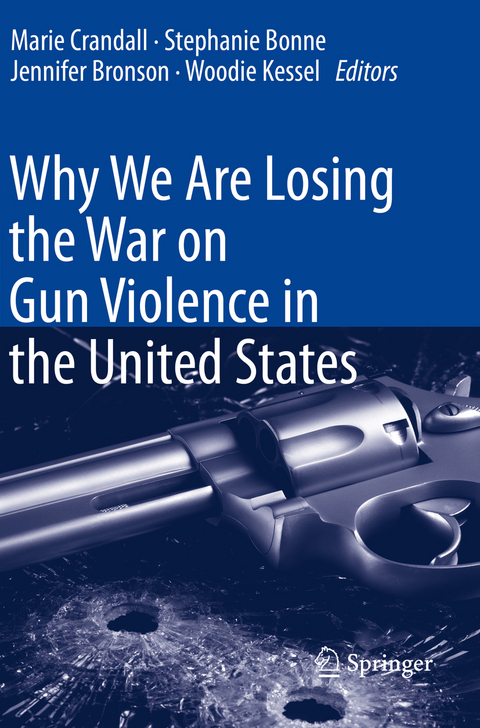
Why We Are Losing the War on Gun Violence in the United States
Springer International Publishing (Verlag)
978-3-030-55515-3 (ISBN)
Gun violence is a public health crisis. It remains politicized and has been paralyzed with inaction. In the chapters, the authors write candidly about the challenges that have thwarted gun violence prevention, as well as highlight possible strategies for progress to save lives. Critical areas explored among the chapters include:
- Gun Violence, Structural Violence, and Social Justice
- School Shootings: Creating Safer Schools
- Mental Illness and Gun Violence
- Understanding the Political Divide in Gun Policy Support
- The Second Amendment and the War on Guns
- The Impact of Policy and Law Enforcement Strategies on Reducing Gun Violence in America
- Youth Gun Violence Prevention Organizing
- Smart Guns Don't Kill People
lt;b>Marie Crandall, MD, MPH, FACS, is Professor of Surgery at the University of Florida (UF) College of Medicine Jacksonville, Associate Chair for Research for the Department of Surgery, and Program Director for the General Surgery residency. She is originally from Detroit, Michigan, a product of Head Start and local public schools. Dr. Crandall obtained a Bachelor's Degree in Neurobiology from University of California, Berkeley, and attended medical school at the Charles R. Drew/UCLA program in Los Angeles. She finished her General Surgery residency at Rush University and Cook County Hospital in Chicago, Illinois, in 2001. In 2003, Dr. Crandall completed a Trauma and Surgical Critical Care Fellowship at Harborview Medical Center in Seattle, Washington, where she also obtained a Master's in Public Health from the University of Washington. She spent 12 years at Northwestern University in Chicago, where she held faculty appointments in both Surgery and Preventive Medicine. She is currently a member of the Division of Acute Care Surgery at UF-Jacksonville. Dr. Crandall performs emergency general and trauma surgery, staffs the SICU, and is an active health services researcher. She has nearly 200 peer-reviewed research publications and more than 200 other publications in the areas of gun violence, injury risk factors and outcomes, disparities, geographic information systems in trauma research, and violence prevention. Her research has been funded internally and externally with almost no gaps since 2006 and now totals more than $2 million. Dr. Crandall is nationally known as a traumatic injury and gun violence expert.
Stephanie Bonne, MD, FACS, is an Associate Professor of surgery in the division of Trauma and Surgical Critical Care at Rutgers New Jersey Medical School in Newark, and practices trauma and critical care surgery at University Hospital. She is the medical director of the center's Hospital Violence Intervention Program, and the surveillance core director of the New Jersey Center on Gun Violence Research at Rutgers University.
Dr. Bonne serves on multiple violence working groups in her role as a state vice chair for the American College of Surgeons Committee on Trauma. She serves as the co-chair of the American Medical Women's Association Gun Violence Prevention Task Force, co-chair of the APHA's Public Health Partnership for the Prevention of Firearm Violence, and is on the research advisory board of the American Foundation for Firearm Reduction in Medicine (AFFIRM). Dr. Bonne is currently a Robert Wood Johnson Clinical Scholar, has been awarded the Claude Organ Traveling Fellowship of the American College of Surgeons, is a graduate of the Future Leaders in Trauma Program, and has been awarded the Eastern Association for the Surgery of Trauma's John M. Templeton, Jr., MD Injury Prevention Research Scholarship and multicenter research scholarship.
Dr. Bonne holds a BA in psychology and biochemistry from Kalamazoo College in Michigan; an MD from Rosalind Franklin University of Medicine and Science in North Chicago, Illinois; completed general surgery residency at the University of Illinois Metropolitan Group in Chicago; and fellowships in surgical critical care and trauma at Washington University in St. Louis, Missouri. She is board certified in general surgery and surgical critical care and is a Fellow of the American College of Surgeons and the American Medical Women's Association.
Jennifer Bronson, PhD, is a founding member and co-chair of American Public Health Association's (APHA) Maternal and Child Health (MCH) Gun Violence Prevention Workgroup, formed in 2013. She has over eight years of experience researching exposure to violence, to include maternal mortality due to violence, exposure to violence among African American young adults, and the National Survey of Children'
1. Scope of firearm injuries in the United States.- 2. Gun Violence, Structural Violence, and Social Justice.- 3. Data on gun violence: what do we know and how do we know it?- 4. Unintentional firearm injuries in children.- 5. School Shootings: Creating Safer Schools.- 6. Intimate partner violence, gun violence, and human rights in the United States.- 7. Mental illness and gun violence.- 8. The need for safety and beliefs about guns.- 9. Understanding the political divide in gun policy support.- 10. The second amendment and the war on guns.- 11. The history of gun law and the second amendment in the United States.- 12. Public health approach to gun violence: "remove the gun handle".- 13. Combatting gun violence in Newark, New Jersey.- 14. The impact of policy and law enforcement strategies on reducing gun violence in America.- 15. Gun buyback programs in the United States.- 16. Hospital-based violence prevention programs: From the ground up.- 17. Looking at theSecond Amendment from the Tenth: Early experiences with a state gun violence research center.- 18. Youth Gun Violence Prevention Organizing.- 19. Smart guns don't kill people.- 20. Reducing the incidence and impact of gun violence through community engagement.- 21. Gun violence and barriers to reparation in the United States: Scars of Survival.
| Erscheinungsdatum | 12.12.2021 |
|---|---|
| Zusatzinfo | XVII, 290 p. 13 illus. in color. |
| Verlagsort | Cham |
| Sprache | englisch |
| Maße | 155 x 235 mm |
| Gewicht | 588 g |
| Themenwelt | Studium ► Querschnittsbereiche ► Prävention / Gesundheitsförderung |
| Schlagworte | 2nd Amendment • concealed carry laws • constitutional right to bear arms • firearm injuries • glamour of carrying firearms and changing social norms • gun buyback programs • Gun Control • gun safety education • gun storage/locks • gun violence prevention • mass shootings • mental health and firearms • police, law enforcement, incarceration • primary, secondary, and tertiary prevention • public health approach to gun violence • racial, socioeconomic, and gender disparities • restrictive gun laws • suicides and homicides • violence prevention programs • Violent crime |
| ISBN-10 | 3-030-55515-1 / 3030555151 |
| ISBN-13 | 978-3-030-55515-3 / 9783030555153 |
| Zustand | Neuware |
| Haben Sie eine Frage zum Produkt? |
aus dem Bereich


